Fall Fruit Guide 2024
- By The FruitGuys
- Reading Time: 6 mins.
Don’t tell summer we said so, but autumn just might be our favorite fruit season. As the days get cooler and the nights grow longer, our regional farm partners start delivering an abundance of fresh fall fruits for our boxes including grapes, apples, and pears at peak ripeness.
“Autumn carries more gold in its pocket than all the other seasons.” –Jim Bishop
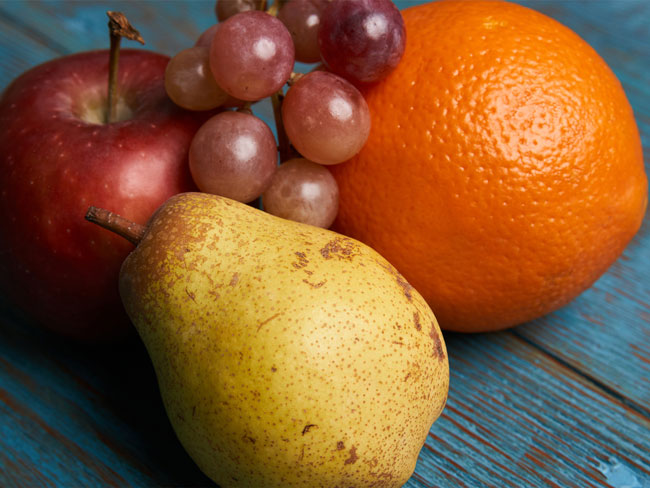
Harvests of those crops are already well underway in most growing regions. So, in the lead-up to the Fall Equinox (Sunday, September 22), we’ve put together our annual Fall Fruit Guide. It gives you a sneak peek at the season’s bounty, including everything from plump and juicy Asian pears to fuzzy little kiwis.
As always, we’re honored to share this guide and farm-fresh fall fruits with you. The more seasonal treats you eat, the happier your body and tastebuds will be.
What’s Coming in Fall Mixes
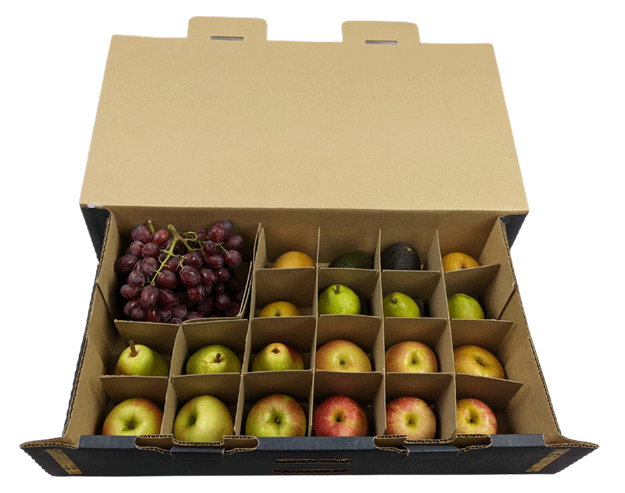
This autumn, our Season’s Best Boxes are stocked entirely with fall fruit (no bananas). But those aren’t the only boxes celebrating the season! The FruitGuys’ Harvest and Staples mixes also offer a wide variety of fall favorites like fresh-picked apples and pears. If you want to see exactly what’s coming in your box, you can always check our Mix page. We post updates on each region’s boxes there every Sunday.
Now, let’s dig into the specific fruits that make autumn so special.
Apples
Apples abound in autumn! We’re so used to eating apples year-round that it’s easy to forget farmers harvest them fresh in the fall and preserve them in cold storage for the rest of the year. Taste a freshly picked apple in our Staples, Harvest, and Season’s Best mixes! We’re already featuring local varieties in all regions.
For our West Coast organic boxes, we love sourcing Sweetie, Gala, Honeycrisp, and Ben Shogun Fuji apples from Cuyama Orchards in California. Look for their Arkansas Black apple—an heirloom variety—in November.
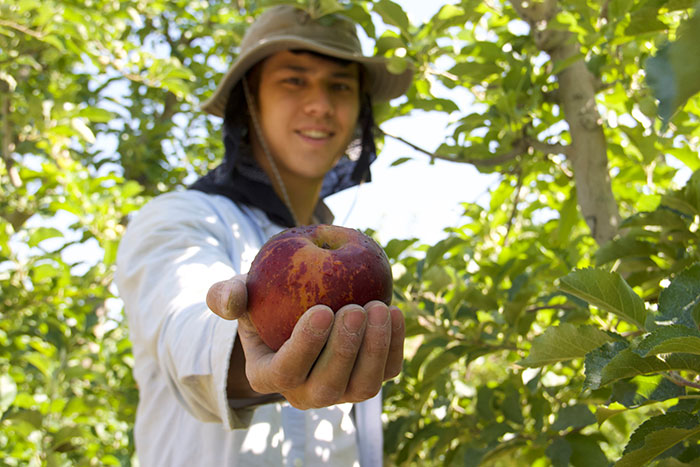
Chicago-area customers should see apple varieties like Fuji, Honeycrisp, and Gala coming from Mick Klüg Farms in Michigan. Meanwhile, our Philadelphia and East Coast friends will enjoy varieties like Gala, McIntosh, and Honeycrisp from our pals at Frecon Farms in Pennsylvania.
If you see brown patches on on your apples or pears this fall, don’t worry—there’s nothing wrong with the fruit. That color comes from a natural process called russeting. Russeting is a brownish, corky, or netlike texture that appears on many apple and pear varieties. It’s perfectly edible and has a yummy, nutty flavor.
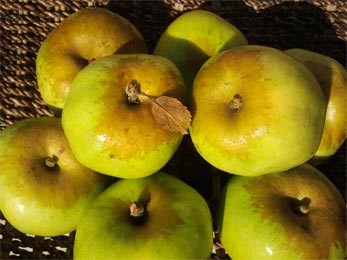
Fruit grown on small farms often has size variations and natural blemishes (what we call fruit beauty marks) that make it look different from fruit found in supermarkets. Just remember that the delicious flavor is well worth the visual imperfections.
Get fresh-picked fall fruit
Pears
Pears are one of the most-anticipated fall fruits. There are so many varieties of pears to sink your teeth into, including the Forelle, Bartlett, Starkrimson, French Butter, Comice, and more. California pear season is already underway, and we’re also sourcing fresh Pennsylvania pears from our farmer friends at Kauffman Orchards. Orchard manager Clair Kauffman grows ten pear varieties (including the glossy yellow Blake’s Pride, a relative of the Bartlett) and says they’re “the best-kept secrets” in the orchard.
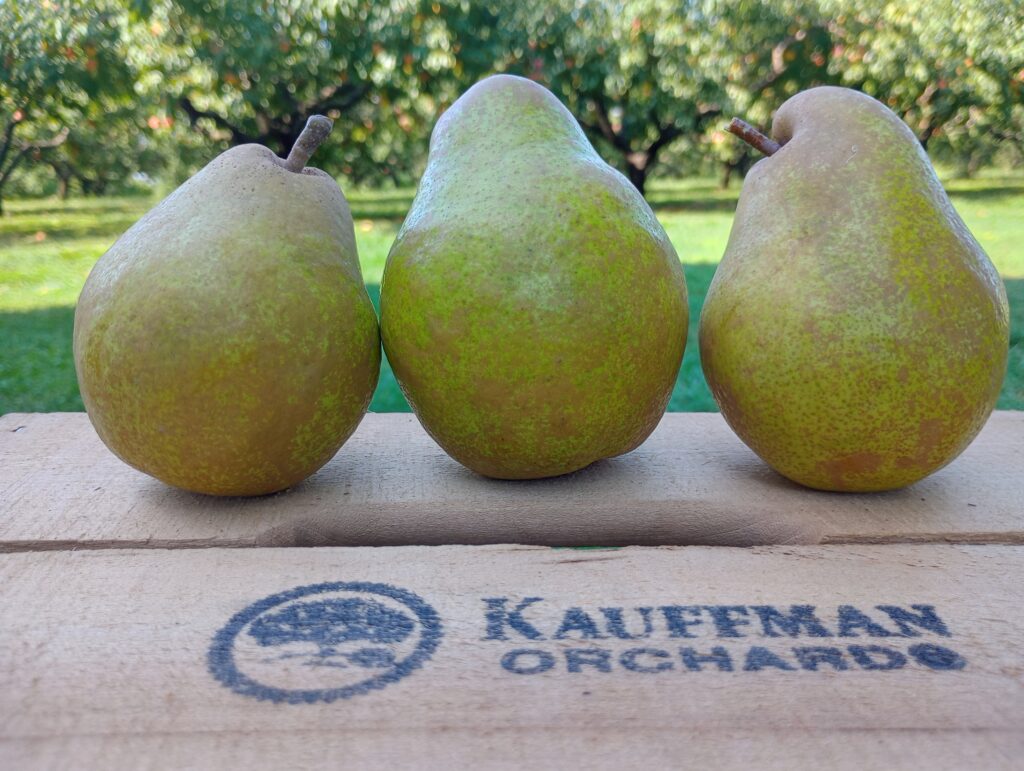
Though the old saying is that “an apple a day keeps the doctor away,” pears are even better for you than apples, containing more zinc, magnesium, calcium, copper, iron, and fiber. So, eat a pear one day and an apple the next to really impress your doctor!
Or, why not try your hand at canning pears this year? In this blog, a prize-winning centenarian canner shares her secrets for canning perfect pears. You can always shop for FruitGuys fruit by the case and place a bulk order of a single commodity, like Bartlett pears, for a canning project or special treat.
Asian Pears
Also known as apple pears, these sisters of the traditional European pear are crispy, juicy, and delicious. Asian pears come mainly from China and Japan, where they have a 3,000-year history. The Japanese varieties tend to be more round and apple-like, while the Chinese ones may have a more elongated Western pear look to them.
Asian pears don’t have shiny skin like apples—their skin is a bit textured and varies in shade from matte-green and bronze to gold. These fruits are juicy but very firm, so they travel well. Inside, you’ll find crisp flesh and complex or even tropical flavors that intensify closer to the core. European pears such as the Bartlett have a smoother, mellower taste profile. Learn more about the differences here.
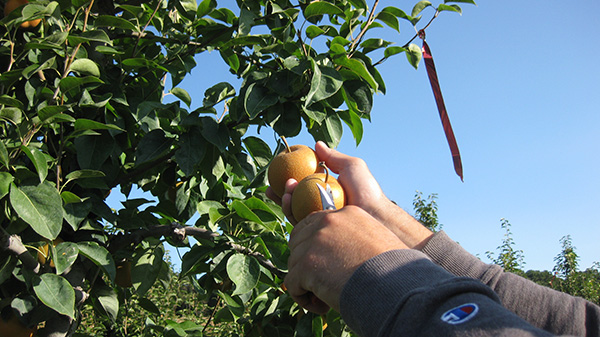
This fall, look for crisp Asian pears from Subarashii Kudamono in Pennsylvania in our East Coast mixes. In some West Coast mixes, we’ll feature juicy 20th Century Asian pears from Earthseed Farm in California.
Citrus Fruits
California valencia oranges from Bernard Ranch should be abundant until the navel (or “winter”) orange harvest begins in November or December. West Coasters can also keep an eye out for California mandarins in October or November.
Valencias have thinner skin and higher juice content than navels and are known for their sweetness. If you notice some “greening” of their peels, don’t fear, they’re still sweet and ripe. Regreening is another fruit beauty mark—a natural phenomenon that doesn’t interfere with the orange’s flavor.
Grapes
California is producing beautiful grapes this year, and we expect them to be available all fall and even into the winter. Fun fact: grapes are actually berries, and those grown for eating (as opposed to, say, winemaking) are called “table grapes.” These fall fruits range in color from pale green to purple-black, and in size from pea-sized Champagne grapes to Japan’s plum-sized Kyoho grapes. Grapes continue to ripen after they’re picked, changing color and evolving in flavor.
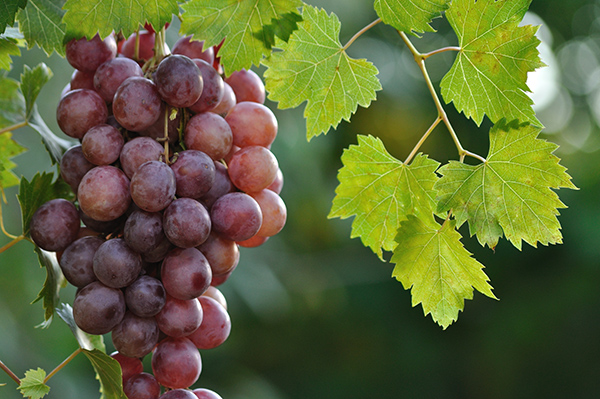
This fall, some West Coast boxes will star California grapes from Rocking Chair Farm Markets in Fresno County, Grapery in Kern County, Fruit World in Fresno County, and King Fresh in the San Joaquin Valley. Keep an eye out for fun and fresh varieties from Grapery, like its long and skinny Moon Drop™ and super-sweet Cotton Candy™ grapes.
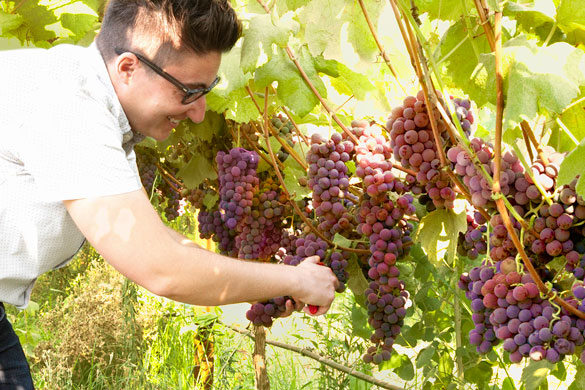
Get fresh-picked fall fruit
Kiwis
One kiwi has only about 50 calories but more than 100% of your daily Vitamin C. California kiwi season runs from November into early spring so look forward to eating these sweet-tart power foods from Brandt Farms as they appear in Harvest boxes this fall. We’re also looking forward to kiwi berries—tiny, fuzz-free kiwi lookalikes—out of Oregon this season.
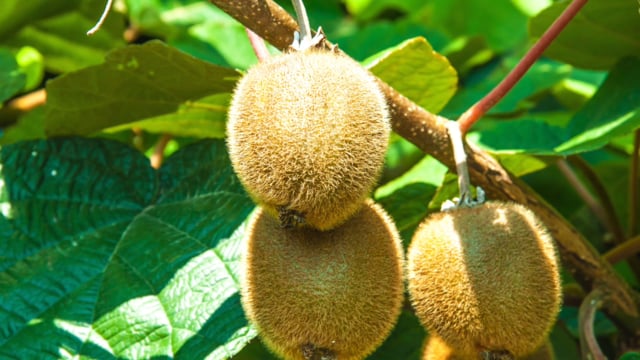
Persimmons
There are two main persimmon varieties: the Fuyu and the Hachiya. The Fuyu persimmon is flat, firm, and ready to eat right out of your hand. It’s perfect for slicing into salads or using as you would an apple. The Hachiya Persimmon is acorn-shaped and needs to be eaten when the flesh is much softer. For our West Coast mixes, we’re looking forward to fresh California persimmons from Earthseed Farm.
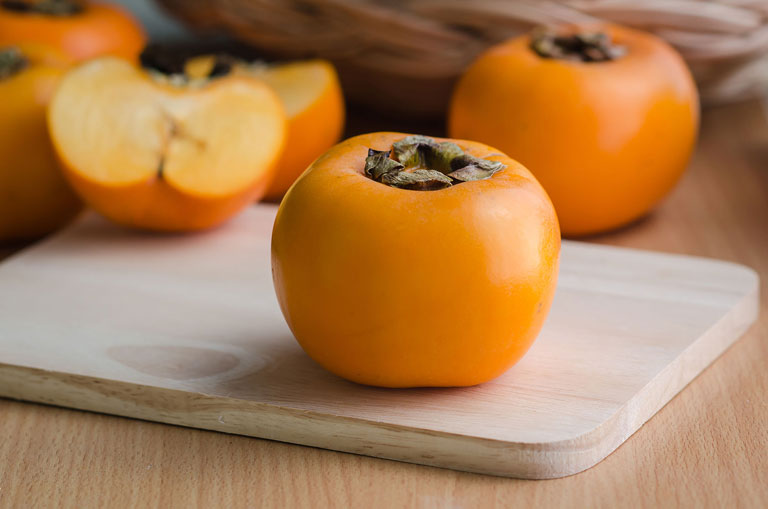
Pomegranates
Of all the fall fruits, the pomegranate is the most elegant and exotic. Leathery skin protects a tightly packed network of brilliant red juice-filled arils (the official name of the jewel-like seeds) cushioned by a bitter membrane. Whether those arils are floating in a flute of champagne or scattered across the top of a salad, they always lend a pop of color and a sense of drama.
Of course, the pomegranate doesn’t give up its treasures without a fight—it takes a bit of work to extract the seeds and eat one. Look for California pomegranates in our Harvest and Season’s Best mixes. Here’s the best way to de-seed a pomegranate.
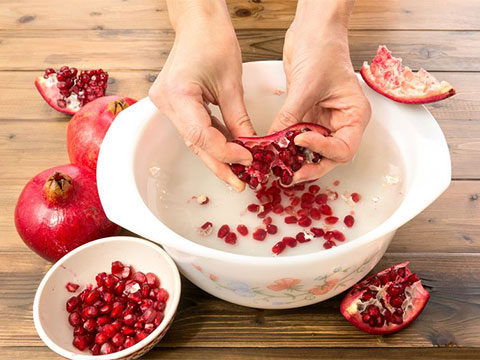
Stone Fruits
Last but not least, we should mention that autumn is the time when we say farewell to stone fruit crops like peaches, nectarines, plums, and pluots. The last of these juicy gems are coming out of California and Pennsylvania. Enjoy them while you can!
Remember, to find out exactly what’s in your mix on any given week, you can always visit our Mix page. It’s the best way to stay up-to-date on the fresh fall fruits we’re packing all season long.
Get fresh-picked fall fruit


